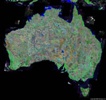 Air New Zealand is carefully positioning itself as a climate-friendly airline with its latest announcement that it is to trial biofuels in a 747 flight from Auckland in the next couple of years. Working with Boeing, Air NZ will be part of the first commercial trial of biofuel, in a Rolls-Royce-powered jumbo in the next 18 months . The flight will only use biofuel in one engine, and will not carry customers. [Stuff, Herald, BBC, June HT blog on aviation biofuels].
Air New Zealand is carefully positioning itself as a climate-friendly airline with its latest announcement that it is to trial biofuels in a 747 flight from Auckland in the next couple of years. Working with Boeing, Air NZ will be part of the first commercial trial of biofuel, in a Rolls-Royce-powered jumbo in the next 18 months . The flight will only use biofuel in one engine, and will not carry customers. [Stuff, Herald, BBC, June HT blog on aviation biofuels].
- Consents are close on a tidal energy trial in the Cook Strait, while Orkney is establishing itself as European leader for tidal and wave power research.
- The NSIDC provides a roundup on this season’s Arctic sea ice collapse, while NASA finds that the loss of multi-year ice plays a large role in ice loss, and warns that sea ice modelling needs some rapid revision. Meanwhile James Hansen suggests to Reuters that a crucial trigger point may have been passed in the Arctic, and a perceptive journalist on the San Diego Union-Tribune notices that loss of sea ice has big implications for the SW USA. [Update 3/10: Andy Revkin has a very good piece in today’s New York Times: the interactive graphic of the Arctic is especially good.]
- A warming world is bad news for rice production, the Indian Agricultural Research Institute has found. Crop yields would be reduced by 10% for every 1ºC temperature increase during the growing season.
- British PM Gordon Brown and Helen Clark have agreed to work together to ensure that the NZ and European carbon markets are “compatible




